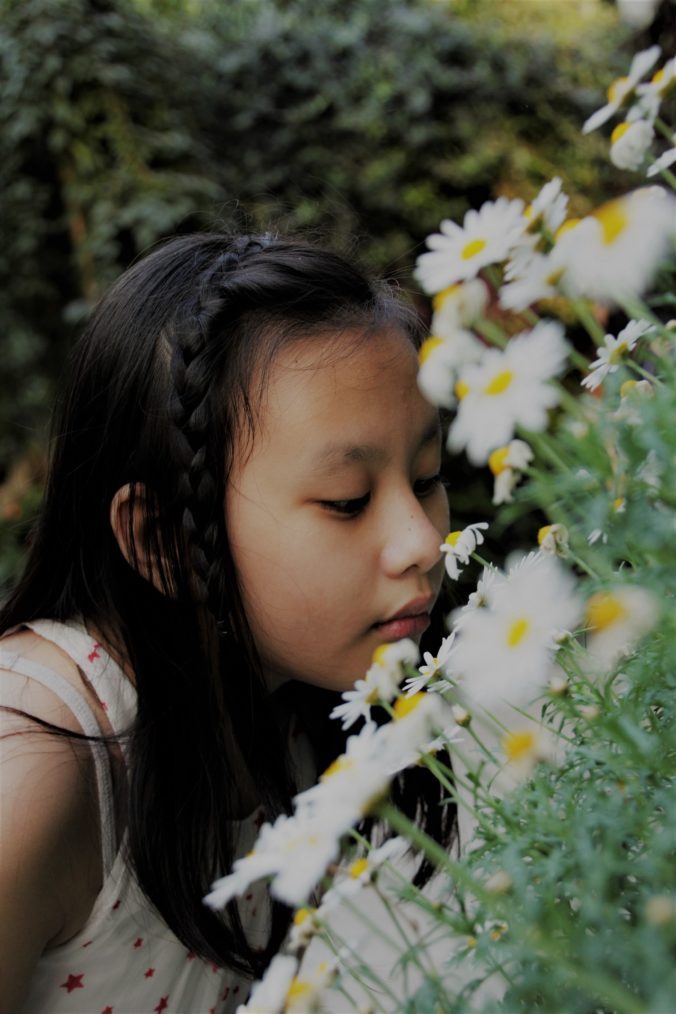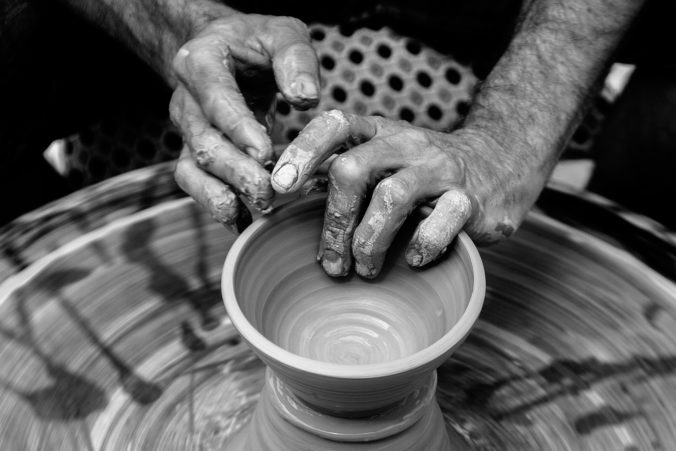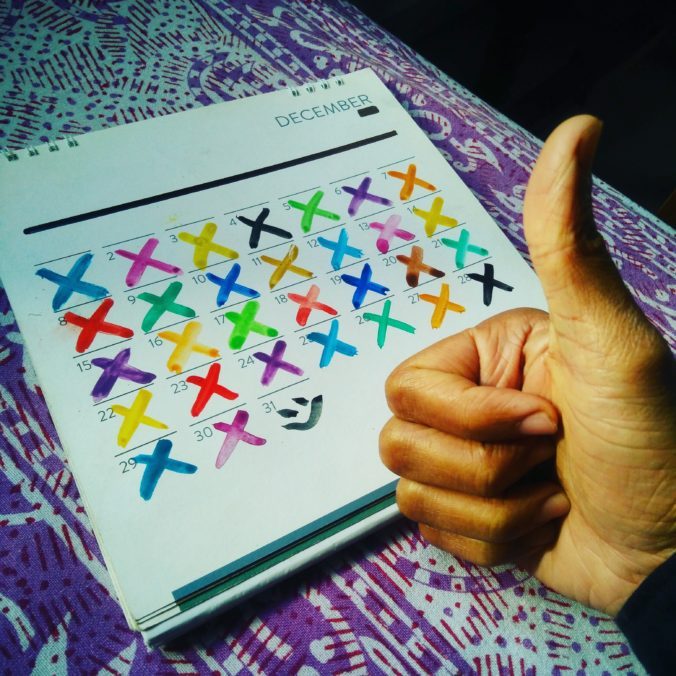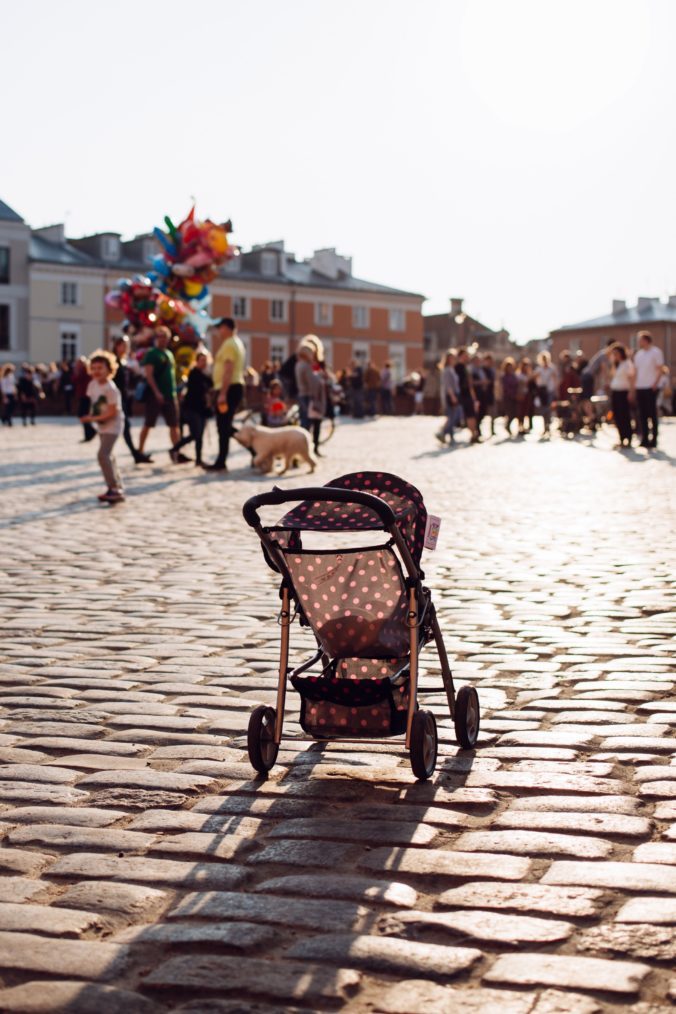A welcoming smile, a moment of laughter…such priceless gifts of expression.
A life bereft of either of these expressions is absolutely unimaginable. When you smile with a loving intent, your eyes gleam and invite others around you to borrow a part of your disarming expression. A smile makes it presence felt first in the eyes. The face merely dons a charm to feel consonant with the way the heart feels at that moment as the smile rides silently, from one set of eyes to another.
However, when you indulge in a moment of laughter, the eyes respond much too differently. Your eyes open up wide at first in a vain attempt to contain the amazement, and soon enough, they shut shop, drawing a blind over the visual world around.
Laughing is a bodily act, where each body part joins in—in its own unique way—to celebrate a mirth-filled moment in time. First your facial muscles jiggle with the giggle, then your shoulders jig up and down as the resulting resonance reaches the epicentre of our gastronomical desires—the stomach. The bouncing belly belches an air of celebration as a loud guffaw hitches a ride on it and laughter echoes in the surroundings, arousing the curiosity of clueless bystanders. If the moment calls for an even greater celebration, the laughter travels through the spines to the legs, making it impossible to be seated to enjoy the moment fully. You stand up, stamp your legs in a vain attempt to douse the flaming source of laughter, for it only intensifies, as your hands join in the celebration in the need to meet the pressing urge of patting your own thigh, or stroking the back of a friend, or best of all, meeting another palm in mid-air to add a smack of a layer in the gamut of giggles infected by laughter.
The success of a smile is in reciprocity while that of laughter is in finding communal consonance. Both expression celebrate our similarities. A smile is an acknowledgement of how we are all seeking the same things and a shared laughter celebrates the pleasure we derive from a common occurrence.
It is interesting to observe how either expression develop in a human since the time of birth. A child learns to smile first. The capacity for laughter develops at much later stage of understanding. Then, perhaps a smile is a more natural expression, a primal state of being.
Laughter being always open to exhibition makes for an attention seeking cousin of an introverted smile. A laugh is perceptible and has more to do with the air (think of the air you expel when you go ha ha), while a smile, subtle by nature, has an almost ethereal quality.
As much solemnity as we attribute to a smile, there are instances when we are forced to smile ad nauseam (ask the bride and groom at an Indian wedding reception), where the seemingly effortless expression, by virtue of repetition, becomes a facial torment. On the other hand, we look forward to unsolicited, belly-aching laughter, as if the pain is a reflection of the pleasure we derive from it.
The extent to which you can control either expression differs greatly. No matter how hard you try, the mirth in a moment can seldom be muffled, for if something tickles your funny bone, you cannot help but let out a loud laugh, almost as if it were an involuntary psychological function.
But the case with smiles, especially as we grow up, is drastically different. We sadly hold a distinction in holding hostage an ocean of smiles, out of fear, insecurity, mistrust, diffidence, and a void of love that we feel inside. And because we withhold our smiles and exercise our control over them to such an extent, an inviting smile from someone that beckons you to emancipate your own, feels liberating, as if a caged bird destined to sing and soar under the open sky is set free.
But if a smile is transmissible, laughter is communicable. A gaggle of giggling gentlemen is bound to pique the interest of bystanders. And, depending on how funny their laughter is, there is a good chance that passers-by find enough amusement in their expression to chuckle for a moment. The tendency of our collective conscience to be moved by a spell of laugh-worthy moment has given rise to the ubiquitous feature in the sitcoms of our generation – the laughter track. It serves as a repetitive aural reminder of what we must find funny in the act. While being constantly reminded of when to laugh can cause vexation, considering how media of entertainment are consumed these days, mostly alone in a dark living room at night, the act of laughing all by yourself, with not another soul around to share the laugh with, one’s own solitary laughter can somehow seem tragic to a viewer.
Desirable as they are, there is a dark side to both a smile and laughter. Think of the smile etched on Joker’s scarred face, or his menacing laughter, think of the Monalisa’s enigmatic smile, the echoes of the laughter of a spectre, or the vengeful laughter of an antagonist that manages to infiltrate into our dreams. By virtue of the purity of either expression, the slightest aberration in delivery invites an unsettling dread. No wonder that the ever laughing is deemed a lunatic, the ever grinning a clown, and as an act of balance, the ever smiling is celebrated as the Buddha.
Nostalgia has charming relationship with either expression. The memory of laughter shared in the past invites a cherishing smile, while the memory of a smile lived in the past might invite a wistful teardrop.
If laughter is a medicine, smiling is therapy. A smile celebrates truth and beauty, while laughter celebrates our capacity for folly, a far unsettling truth that’s best tempered by our ability to laugh it away.
A smile emanates from the core of the soul and laughter springs from the core of our body. No prizes for guessing then, on how to keep your body and soul awake, alive, and thriving.
Category: Lifestyle (Page 1 of 2)

Finding an Equinox in Life on Solstice
December 21. The eve of the solstice. A local celestial event that bathes earth in different hues of light, with peculiar views of the sun, no matter where you are on the planet.
As the tilt of northern pole, reaches its furthest extremity with respect to the earth’s annual pilgrimage around the sun, the Northern hemisphere, curled up in the windy winter, witnesses the shortest day of the year. At the same time, the south pole, leans closest to the sun, as the southern hemisphere saunters in summery delight, witnessing the longest day of the year, just a few days before a Christmas celebrated sans the celebratory snowfall.
And the closer you are to the poles, the more fascinating the spectacle. Beyond the Arctic Circle, the sun wouldn’t hover even for a moment in the sky, drenching the area in darkness, while within the Antarctic Circle, the sun would efface the night, as it suspends in the sky all through the 24 hours that make a day.
The gentle tilt of the earth gives us so much to celebrate – the gift of seasons, the trade winds, a breath-taking biodiversity and of course, seemingly unearthly events of solstices.
While a solstice is a fascinating earthly phenomenon that marks the extremes of the duration of daylight, the human conception of a day, its length and the value derived from it is rarely synchronous to the event. There are cultural and psychological influences at play that dictate our relationship with the duration and depth of what we now understand as a day.
In the sweep of advancing technology, our species has successfully conquered darkness with illumination. Culturally, we’ve moved beyond the local solar day, thanks to household electrification. Being a flick of a switch away from illumination past sundown, our days have become longer for sure.
However, as far as we have come from being dictated by nature beyond us, we are still tethered to our own human nature. On a psychological level, each human perceives the length of a day differently. It’s an experience as personal as a dream that nobody else is privy to. A day spent in good company or spent being meaningfully engaged, breezes past elegantly. But a day spend without purpose slithers painfully, adding undesired friction in our stride.
Evidently, a ‘long day’ at work is a phrase that’s being used far too often in our cultural parlance, part due to the wear-out, part in lament of a day divested of depth. Gone are the times when daylight was celebrated as an incantation for living life outdoors in the field and the nights were a hymn that decreed us to rest peacefully.
Most of us have lost the privilege of retiring from work as the sun retreats beyond the horizon. Global connectivity and economic metrics can dictate us to work as the sun rises and sets in a more prosperous part of the world, time zones apart.
Our days have come far beyond the solar day. Incandescence has bled into our earthly night as we forget the value of the most natural de-markers of dusk from dawn.
And along with that, we’ve lost the romance for the spirited rise of the sun. We have a hard time recollecting the last instance when we watched the parting winter sun paint splendid hues in the sky, with a dazzling Venus in its tow. Perhaps the further away we are from such natural invitations for contemplation, the more unsettled we become deep inside.
We live in a funny era, where after unsettling elegantly designed natural equilibria, we run around like chickens to find balance in life!
The workdays are becoming longer, so are the commutes, and sleep is drifting further away from being a continuum of placid repose.
The best thing about a good night’s sleep, just like a good day’s work, is how you only remember the beginning and the end, while all the magic that happens in between is effortless as a flamboyant stroke on the canvas by a painter in flow. A good day at work and a good night of sleep are precursors (and pre-requisites) of each other, in our daily cyclic dance. And more than duration, what matters most in either engagements, is depth.
Nowhere else is this profundity of engagement better exhibited during childhood days. The presence in each moment of wakefulness, in each moment at play is at its zenith. And the hours of sleep are as deep as they can be, in preparation for another day full of joy and zeal.
Perhaps what we need more than longevity in life, is the elegant passage of time, both in sleep and in wakefulness. And, as time passes elegantly, the notions of length of the day would matter little, for what would matter more is the completeness in our involvement in all states of our consciousness.
Then shall we find a balance, not a perennial solstice in our workdays where the days are always long, but an equinox, with profound presence throughout, both in sleep and in wakefulness, regardless of the position of the sun in the sky, regardless of the state of our consciousness.
Today is the shortest day of the year. Perhaps, for a change, it would be nice to give up control of the luminosity around us, and watch the sun paint a silhouette in the far horizon. If we choose to do so, the Venus shall burn brighter, in its retreat into the afterglow. While the length of the day today on 21 December, might be the shortest this year, the presence in the moment, as we pore the sky in wonder, shall be a worthy consolation.
The sense of smell.
Suffused silently in the ebb and flow of breath, such is its subtlety that we seldom take note of its presence. But as easy it is for us to imagine a person who can’t see, hear or speak, can we imagine a person who can’t smell? It almost feels as if such a person couldn’t be alive, for the loss of the sense of smell feels akin to loss of the breath itself.
The olfactory sense is perhaps one of the most visceral of all, for unlike the sense of sight that is related to the eye, or the sense of hearing associated with the ear, or the sense of touch felt by the skin, it doesn’t seem as easy to associate an organ with the sense of smell. While we do breathe in from the nose, there’s something mysterious about how we make sense of smell, a working far more complex that merely sniffing through our nostrils.
There is an evocative potential in
every scent. Each lingering scent that we’ve experienced in our life
is meticulously bookmarked in the brain as a memory. And what makes the
memory so special is that the scent that brings it forth cannot be
reproduced at will.
You can listen to an old song that you wish to
hear, or look at a photograph you had clicked years ago, as you can
still pull those out at will from a digital repository.
But how do
you pull out the aroma that used to emanate from the kitchen at your
grandmother’s place when you visited her at age 6?
Having said that,
should you inadvertently find someone crushing coriander seeds in a
mortar and pestle in the neighborhood, it could teleport you to your
grandmother’s kitchen in an instant.
Such is the evocative energy !
While
we humans do not have as keen a sense of smell as animals, it has been
instrumental in our survival and perpetuation through the ages.
Odour
plays a significant role in mating. Attraction has a lot to do with
finding a partner with an agreeable and enchanting scent.
But there’s a role that an unpleasant odour play as well. Think of the miracle of nature, that any food that is unappetizing or toxic to our biology invariably emits an unpleasant odour, steering us clear from the idea of consuming it.
A person’s natural odour, until not too long ago, was an identity in itself. However, once humankind figured out the science of aromatics, the deep personality in the natural scent of a human has wafted away, and a dab, a drop, a drizzle, of a synthetic concoction has effaced our natural olfactory fingerprint.
Modernity
has only made us feel insecure about our own musk. And in a world where
cultural aspirations tend to funnel towards a white-collar office job,
breaking into a sweat while at work has sadly, lost its charm.
Sweating
is the body’s natural mechanism to cool-off, flush out toxins and bring
a soothing relief from stressful physical work.
A moist layer of
skin, a dripping brow, the sublime sweetness of a saline secretion, were
all tangible testimonies to the effort we put into our work.
At some
level, after a hard day at work, as the evening breeze brushed against a
peasant’s skin, along with the heat it took away from the body, the
sweat also took away all pent up stress.
In our modern office
environment, where we are conditioned to the extent that even the air we
breathe is but conditioned, and as we attribute more respect to
cerebral work, the association of sweat with hard work has been reduced
to a mere metaphor.
Now, as we’ve begun to associate sweat with
drudgery, with no way to dissipate stress through our pores, have we not
designed a drudgery for ourselves in our sterile work environment?
Should the proliferation of stress management workshops ever come as a surprise?
Sweat
and body odour are seen (through the lens of modernity) as problems,
which can be remedied if one is willing to tow the line of advertizing
and spend money.
‘The scent of desire’, ‘The musk of Masculinity’ and
if you’re willing to believe, the advertizers, they’ve even concocted
‘The scent of success’!
Granted some of us need respite from the
pungent chemistry of certain pairs of underarms, but how does the
noxious, repulsive blend of body odour and a synthetic fragrance help us
in such a situation?
Perhaps a little hygiene and moderation in what we put into our bodies would help us all?
The
culture of seeking synthetic scents isn’t merely the case of addressing
the symptom and not the cause. It is emblematic a morbid mentality of
thinking that our natural body odour is a problem in itself.
Can one’s natural identity become a problem? Good luck feeling secure if you’re riding on that train!
Natural scents are ethereal. But so are the subliminal traps of synthetic aroma and crafty advertising, that aren’t the easiest to circumvent in our current social culture.
But once purged from the platter of aromatics, you would realise that it’s far more romantic to get a whiff of your beloved’s pheromones, secreted solely to enchant you, than any synthetic scent on the shelf. That a baby deserves to smell like its subtle self and is better off without the generic scent of carcinogenic talcum powder. The freshness of a pair of clothes dried naturally in the sunlight far surpasses what a fragrant fabric conditioner can do. And your natural musk, in whatever health at the moment, is in fact, all yours.
In closing, I would like to share an interesting sensory discovery. The other day, I walked into a shop in the old city that sells attar, a traditional, steam-distilled perfume. One of the latest fragrances on the shelf was called ‘the smell of the earth’.
While it smelt surprisingly similar to the smell of the earth, the lingering aroma also left me wondering.
How
far have we drifted away from the earth, to need to seek it’s aroma so
desperately, albeit, in a packaged synthetic concoction?
We have progressed to an extent to have deciphered the science of smell.
But it’s one thing to smell like the earth,
And another to smell of it.
Nature has – as a provision for an evolutionary fillip- designed us to be a pleasure seeking species. It is our basic instinct to maximize pleasure and alleviate pain. From the joy in the warmth of an embrace, to the alluring magnetism of a baby’s smile, to the existentially satisfying act of procreation, nature has designed our experience of pleasure to meet its longing for itself, through our perennial pursuit for posterity.
Up until a few decades ago, our pleasures were few and far in between, and certainly, not accessible at will. To even get a bowl of french fries, one had to wait for the winter harvest. Think of the ubiquity of our starch laden indulgence in our tech-dictated age, where it is just a few taps away on the screen!
Technology has ushered in pleasures at a rate far beyond a human’s capacity to experience them. The brain, stimulated constantly by novel stimuli, seems to be in overdrive from the rush of dopamine and serotonin. The ease with which pleasures are available to us in today’s age also begs us to contemplate about where exactly pleasure morphs into peril, access into addiction. How many addictions have we sanitized to normalcy?
Have we, in seeking pleasure, forgotten to discern which pleasures are worth pursuing and which ones are best avoided?
Before we talk about discernment, let’s simplify the types of pleasures we go out to seek.
At the risk of sounding simplistic, I believe that broadly, there are two kinds of pleasures:
1. The Simple Pleasures
2. The Easy Pleasures
The simpler pleasures of life are, in most cases, accessible to one and all without discrimination. A simple pleasure of life is accessible in the following two ways.
A Simple Pleasure :
a. Accessible by a Deep Presence : Think of a calming wind caressing your skin, a field of sunflowers in full bloom, glancing your finger on a touch-me-not plant, or watching the luminous courtship dance of fireflies on a dark night. These are simple pleasures accessible to anyone who is mindfully present in the moment.
b. Accessible by a Deep Perseverance : Think of the time when you created something new, a demanding pursuit that was awarded with the simple pleasure of a smile that stems from deep within, on realizing the beauty of what you’ve created. It could be a pot, a play, a sketch, a symphony, a code or a caramel cookie. Manifesting anew gives joy abound.
However, we are confronted with another kind of pleasure in today’s day and age. The Easier Pleasure.
The Easier Pleasures are :
a. Accessible as Cheap-Thrills : (vices, addictions, passive digital entertainment, sexual self-gratification, pornography)
b. Accessible as Lifestyle Frills : (Consumption borne out of wants and not needs, individualism to the point of corruption of the longing for fraternity, the culture of seeking identity from objects)
How does one discern between the two types of pleasures?
There’s a straightforward test to know the difference between a simple pleasure and an easy pleasure. A simple pleasure is borne out of creation. It could be the pleasure one gets from creating something or in marveling in being able to experience what someone else/ nature has created.
An easier pleasure is borne out of consumption. Through most of human history, the easier pleasure was accessible only to a select few. But with worldwide access to the internet, the easier pleasures have become accessible to much of our generation.
What if I were to suggest that the quality of your life is a function of the choice you make when confronted with the promise of experiencing pleasure?
While you have been designed to be a pleasure seeking being, and the body doesn’t discern a detrimental pleasure from a favorable one (it fires up the same happy hormones in either case!), the responsibility of making a wise choice rests on your own mind.
The more lasting pleasures are the ones that have been earned through perseverance, or through a solemn presence in the unfolding moment – the simpler pleasures that one is more likely to reminisce about around a warm fire-place on a winter evening.
Creating something is perhaps the most demanding pleasure of them all that calls for a devotion that is absolute. But it is a much more character building than the pleasure that comes from the effortlessly accessible act of crude consumption.
The prospect of a meaningful life rests on how well you are able to navigate the pleasure paradigm. While the easier, short-term pleasures are easy to access, they seldom qualify as prized nostalgia, nor do they chisel your character to reveal a more glorious manifestation of your self.
Steering our pleasure-seeking self in the direction that asks for presence and perseverance is the prudent choice.
And when in a dilemma in choosing between the promise of two pleasures, ask yourself which one of the two is an easier pleasure and which one is the simpler pleasure. Once you can discern that, set sail to the winds of the latter.
For wisdom lay in choosing your pleasures wisely.
Life is full of situations where we must make a choice. And it is the choices that determine the future course of our journey.
Each choice can affect the entropy of the existing situation in two ways. It can either
A) Conserve order
B) Disrupt order
Consider the example of a traffic signal. One can either follow the rules as prescribed , conserve order and ensure the smooth functioning of a system that is designed to be efficient and safe as long as the rules are adhered to.
Or, one can act in self interest, try to cut corners and disrupt the system. In this case though, breaking the order comes at the cost of the overall safety and efficiency of the system. The selfish behavior of breaking order comes at the cost of ease and well being of everyone else. Perhaps it is in the best interest of everyone to conserve order in this case.
But it is not imperative to conserve order at all times. Ossified ideologies, broken systems, dated models of education are meant to be disrupted. The disruption is a form of non- conformity that ushers in innovation.
Preserving order in such a case is detrimental to the progress of every stakeholder. If each of us remains selfish and chooses conformity over creativity, a dated system prevails at the cost of the possibility of a better future.
But if one is driven by the cause of a greater good and chooses to disrupt the order, a revolution whose time has come may find momentum.
Perhaps it makes better sense to take decisions based on whether your choices and actions are directed to bring a greater good in the community.
The decision that ensures the well-being of all is the best choice, whether it dictates to preserve order or to disrupt it.
Wisdom lay in recognizing when you are supposed to conserve order and when to create chaos, and acting or not acting, in the greater interest.
Depression.
A state of mind that we all face at some point in our life. And sadly, it is something we dread accepting, and confronting the way it is.
I am not talking about clinical depression here. I speak about a general discontent and disillusionment towards life, that makes one feel inactive and despondent.
This feeling plagues us all at some point in our lives. While we cannot do away with it altogether, can we design a scheme that helps us swim out of the pool of passivity?
Today, I would like to suggest a method that has helped me overcome despondency and realign my focus in life.
It is a four step process called ‘The Habit Loop’.
The steps are as follows :
1) Acceptance
A couple of days ago, as I was sharing my somber state of mind with a friend, she told me something that changed my perspective towards the issues I was facing.
She told me that it is but human to feel the way I was feeling at some point in life. One cannot be motivated and enthusiastic all the time. In fact, would it even be desirable!
That insight gave me the courage to accept my state of mind as it was.
It is normal to feel despondent from time to time. It is best to avoid to whirlpool of ‘why me?’ and stay clear of self pity.
2) Resolution
The most important question you must answer in a despondent state of mind is :
Do I want to come out of this phase?
Only when you have made a deliberate decision that you want to come out of this phase can you move forward from where you stand.
The resolution to change things, a decision that comes from deep within, is paramount.
3) Confrontation
Now that you have accepted your state of mind and decided to bring about a change, what should be the next step?
In my experience, the most obvious symptom of depression is when one stops to confront himself.
There is a tendency to :
A) disrupt all systems one adhered to that brought a sense of structure to life
B) cave to desires of decadence, marked particularly by over-indulgence in consuming data, food, sex
C) not confront yourself, look into the mirror, or create art
We do all of this while being fully aware that it doesn’t serve us best.
The easiest way to come out of this state is by confronting yourself.
Here’s a few ways that might help one do that:
1) Take a sheet of paper and write down what you have been doing and why.
2) If writing is not your thing, make a voice note, speak what exactly what you’ve been up to and why
3) The most effective one, is to make a video, speak into the camera about your current state of mind and what you’ve been doing while you were stuck in the rut
This is the step that will truly test your resolution, whether you want to really get out a depressed state of mind or not.
But as soon you start doing this, you will realize that you have enough self respect to not bullshit yourself to no end. Within a few minutes, you will address matters that have been responsible for your despondency and find ways to come out of it.
It is self diagnosis, and it works better than anything else I’ve come across.
4) Repetition
Of course, you will need to repeat the whole process over and over and build your resilience.
With enough practice, you will be able to
face the vicissitudes of life with equanimity.
It might take a while to crawl out of a somber state, but the more you repeat the four step habit loop, the easier it will become along the way.
I hope my suggestion helps you in times of trouble.
Feel free to share your experiences, reflections and feedback in the comments below.
If you feel this article will help someone is need, please feel free to share it with them.
Good luck on the bumpy roller coaster ride of life!
It is the first day of 2019 !
Foremost, I would like to wish you a very Happy New Year.
A few days ago, I had shared an idea about why we should aim to have a New Year theme and not a list of resolutions for the New Year.
Following my own advice, I have come up with a year theme for the year 2019.
The theme for this year is :
PUTTING MY BELIEFS TO TEST
On a personal level, I have always felt that the way I lead my life might not always reflect the values I think I have.
Because, a belief has to go through the test of life to become a living value in a person’s character. It is easy to advertise or assume a set of beliefs as our own, but to truly live by them in each moment is a challenge.
For example,
I might believe that Non-Violence should be a philosophy I must adhere to. But in order for it to become a value I live by, I must practice it with great deliberation for years and put it through the test of life.
Each brick in the foundation of my values has to be cured by the kiln of life.
A few beliefs I have at this stage are:
1) TRUST IN THE UNIVERSE
I believe that the Universe has an exquisite design. Each action has a consequence, no matter how oblivious I might be of it. In that light, I believe in doing the best I can with the gift of Life.
Will Karma take care of the rest?
2) NON-DUALITY
I believe all of existence to be One.
We dwell in a cosmic pool of consciousness, infinite in every dimension.
If all of existence is One, whatever I do to someone else, is akin to doing the same thing to myself.
Then, what must I do with my time and my life?
3) CREATING GIFTS AND PRACTICING GIFT ECONOMY
This belief is a natural extension of the two that precede it.
As a human being, I must make the best use of my creative energy and share it with the world. The gift of life must beget more gifts for the world around me.
No matter how much I have, I must always be willing to share.
As rosy as it sounds,
Is there an inherent fairness in this parallel economy?
I will only know when the belief has been through the test of life.
I am mentioning just three of my current beliefs to drive home the point of why I am choosing to put them to test in this New Year.
How shall I do it?
By living mindfully, in practical adherence to all my beliefs.
My beliefs cannot remain cerebral concepts to be availed during discussions with friends. They have to be tested through.
This year I want to have an empirical existence.
Maybe an year is too short a time to test my beliefs.
But it is still a start.
I feel a nervous excitement inside me.
It is a good sign !
Have you thought of a New Year theme yet?
I hope you have.
This is going to be quite a wild ride.
Let the adventure begin !
It is the last day of 2018. And it gives me great happiness to share that I have been able to successfully complete my Power of Everyday project for the month of December.
The Power of Everyday is a project I started this year with the aim of learning the impact of consistent, deliberate practice. I would choose a few activities on the first day of a month and would promise myself to practice them every single day of that particular month. At the end of the month, I would reflect on what I learned from the exercise.
After an year of experiments, I can safely say that The Power of Everyday has been the most transformational activity I’ve ever engaged in.
The positive changes were so obvious that my friends also started to take up this challenge and found value in the exercise.
Today, I would like to share a few crucial learnings from this year long exercise and why I recommend you to take up this challenge so highly.
1) YOU WILL FINALLY START DOING THINGS YOU ALWAYS WANTED TO
Let us face it. We don’t even do half of the things we have always dreamt of doing. I am not even talking about big lofty dreams. We fail to do even the most simple of activities that will only do us good, if done consistently.
Even simple lifestyle habits like waking up bright and early, going for a run, engaging yourself creatively, cultivating love and gratitude are hard to inculcate.
Mostly, because we do not have a structure and direction.
The Power of Everyday challenge gives you both the structure and direction to cultivate a positive lifestyle.
I had always wanted to start writing a meaningful blog, practise Yoga and Meditation, Journal every day. But only after I found the structure of the Power of Everyday project did I start doing all of these activities.
If you wish to push yourself to be better and are looking for a framework that would help, The Power of Everyday is what you need.
2) YOU WILL REDEFINE WHAT NORMAL MEANS TO YOU
A year ago, writing everyday seemed impossible, staying celibate for months on end seemed superhuman, writing with the left hand everyday was a punishment, and practicing Yoga or Meditation everyday felt like an unachievable dream.
But once I started to have these activities as a Power of Everyday project, I cultivated the stamina to do these things day after day. And before I knew, what seemed unachievable got reduced to a natural daily ritual.
At the end of the year, I do all the above mentioned activities naturally, even if they aren’t on my challenge list anymore. Practicing them everyday for a few months redefined what normalcy meant to me.
3) IT IS A SELF CREATED POSITIVE PSYCHOLOGY PILL
Every time that you tick off a day on your calendar after successfully finishing the Power of everyday task you defined for yourself, you will find yourself smiling.
You will naturally feel good about the achievement.
The task, the activity and the appraisal, all three of them, come from within you.
It is a simple way to find daily contentment.
Citing a personal example, I had committed to writing and publishing a blog post every single day in the month of December. It was a daunting challenge. I had no idea if I could come up with that many ideas to share with the world. But everyday that I finished the task, I would tick off that date on the calendar and feel a great sense of contentment.
Today, I will be ticking off the last day of the month.
I couldn’t be happier !
I hope my pitch was convincing enough for you to consider starting a Power of Everyday project for yourself.
If you are wondering what task you should choose, go here and find one that suits you.
For the month of January, I have two tasks lined up for me :
1) Write and Publish a Blog post everyday
2) Sketch/ Paint every day
The first task has been carried over from last month in the interest of making daily writing a ritual.
The second task is to infuse a sense of novelty and imagination with a form of expression I haven’t explored in a long time.
What is your Power of Everyday challenge going to be in January 2019?
Leave a comment below and let us know.
It is a truly transformational exercise.
Let’s do this together !
A billboard it said, that happiness is far,
Unless you drove around in a car.
Convinced she bought a car, a pram, a wheelchair,
And deprived herself of any time to care.
The lady, she fell for the sinister scam,
Of putting her baby in a pram
Busy as a bee, with work and earning,
For warmth and love, her baby kept yearning.
And on a Sunday, in wishful despair,
She put her mother in a wheelchair
Mother, she prayed night and noon,
Far better if her end came too soon.
Before it occurred to the lady’s mind
The baby could speak, mother became blind
But she had no time for Joy or sorrow,
She promised to attend to them tomorrow.
The blind mother mistakes the nurse for daughter
And Nanny was the first word the baby uttered
It left the busy lady aghast
But it drove some sense into her at last.
With three four wheelers and no space for touch,
She missed out on motherhood, a loss such !
Attention deficit, forever in a car seat,
The convenience of wheels rendered her obsolete.
A lesson learnt tough, much did it reveal,
A sacred law of nature did she repeal
And now she knows, deeply does she feel
What a wasteful attempt it was,
To reinvent the wheel.
A friend once asked me,
‘What is that one habit you’ve cultivated over the years that has changed your life?’
‘Daily Journalling’ I said without thinking twice.
‘Wow, that is a surprisingly quick answer! How did you have such clarity in your thought to come up with a prompt responses?’
My response was the same again,
‘Daily Journalling’.
—
For the past two years, I’ve been trying consistently to archive my thoughts daily in my Journal. Despite many failures, something always brought me back to the journal.
I have found such value in the habit that I use every chance I get to endorse daily journaling as a life transforming exercise.
Today, I’d like to make a case for why you should consider Daily Journaling as a new year resolution.
Here’s a few reasons why I recommend Journaling so much :
1) FOCUS – In the age of the distraction economy, it is easy to be passively engaged. But to make a positive change in any sphere, we need active engagement. Journaling helps you keep focussed on your goals and what you should be doing in order to achieve them.
2) STRUCTURE – When you do something everyday, it adds structure to your life. And this influences the prospect of having consistency in our daily lives.
3) CREATIVITY – A journal by no means needs to be solemn and dignified. It can be that if you want it to, but you can also use it to foster creativity. Doodles and digits hold as much value as words. A blank page is an invitation to infinity.
4) ARCHIVE : Once you’ve been journaling for a while, you will have repository of old thoughts and nostalgia in those reams of paper. It is a great way to reflect back on your life and evolution over time.
5) CLARITY : This is the best part about daily journaling. You will be naturally writing about everything around you, from what you like to eat, what love means, about your dreams and fears, about what you learned on a particular day…
Since you have been reflecting about things like this daily, you will gain a mental clarity you’d never known earlier.
Now, we all know, it is not easy to form a habit. Even if it is going to only do you good, it is easy to fall out of the habit. You will have to approach it in a way so that the habit sticks.
Here are a few suggestions from my end that will help in that regard :
1) START SMALL
Start with a tiny notebook. Only write one line a day. That isn’t too hard is it?
Here’s a link to an amazing TED Talk by B J Fogg about the power of tiny habits. I found it extremely insightful and highly recommend that you watch it.
If committing for a year seems too much, have it as a ‘Power Of Everyday’ project.
How about January 🙂 ?
2) PEN AND PAPER
Write with a pen and paper. It gives you the freedom to scribble, doodle and draw along with writing. Also, you are much likely to read your past diary entries if you write them on paper.
Even in the digital age, that is the way to go.
3) WRITE THE FIRST LINE ASAP
We all know the horror of confronting a blank page. Let it not bog you down. Write anything that comes to your mind right away. It could be as simple as a good morning wish.
Once the page isn’t blank anymore, writing will become easy.
4) FIX A TIME
Make it into a ritual. Write at a particular hour everyday. It could be right at sunrise or during your commute back form work. Let it help you add structure to your day.
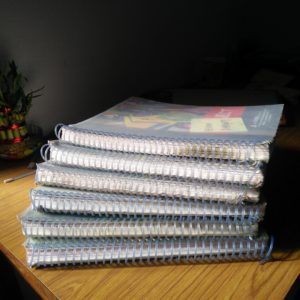
My journals over the past two years
If you keep at this habit for long enough, soon you would start to miss it even if you stopped writing only for one day !
I know that for someone who doesn’t journal, this would seem outright odd.
But I’ve learnt this with my own experience, it is something I would rather not live without !
Take your time and think this through.
I have a feeling that everyone should be writing a journal in the interest of living a focused, deliberate and creative life.
Let’s do this together !

